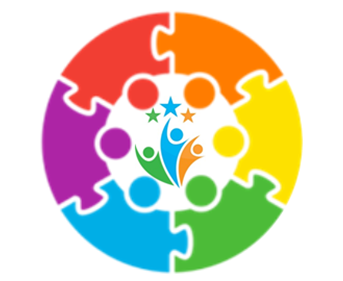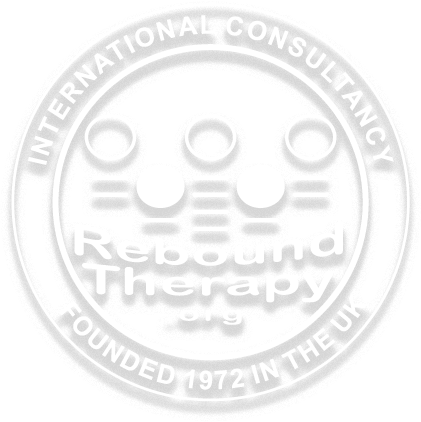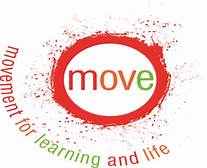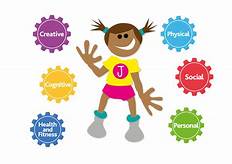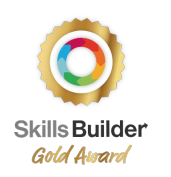Core-English- Reading and Phonics
How do we prioritise reading?
- Each of our classrooms has a cosy and comfortable reading corner or area where pupils can sit during the day to read a book.
- Books are rotated regularly by staff and students to match the class topic, new sounds and vocabulary and pupils’ interests.
- We have recently refurbished our library area and used student and staff to help to design, choose furniture and decoration and books. We now also have a new reading room/snug-which acts as an absolute quiet haven for students to curl up with a good book.
- We endeavour to use books and high-quality texts to enrich the learning and provide access to a range of genres and text types.
- To encourage reading at home, we use Class Dojo to promote reading and reward Dojo points for each time a child reads. We also use reading journals for parents and carers to track the reading at home-this works as a great tool to monitor pupils not reading at home, so we can provide extra provision in school.
- We have a termly ‘Reading Newsletter’ which covers the highlights of reading that term, contains brilliant book recommendations and covers top tips on how to keep the children enjoying reading over the holidays.
- Reading is celebrated in our school celebration assembly each week, with pupils being awarded ‘Reading Star of the week’
- We hold reading events throughout the year such as Drop and Reads, Story-telling, Stories from other Cultures, Author Days and World Book Day.
- We hold mixed class phonics and reading sessions 4X a week when small focused groups of similar ability children access either sensory phonics-phase 1-6 phonics sessions-with the Twinkl Phonics programme techniques, whole word, SPAG, comprehension and guided reading sessions.
- Children are assessed termly using the Twinkl phonics assessments and Phase 1-6 student assessments to ensure they are grouped according to their ability.
- Staff are trained and supported to deliver high quality sessions and to monitor the progress of the group they are teaching. Whole School Twinkl phonics CPD delivered to all staff.
- Early reading is encouraged by providing pupils with non-worded reading books in the first instance. Once they have developed their phonics and decoding skills, they are then moved on to texts that match their phonic ability and are fully decodable.
- Pupils who are learning to read through Phonics take home 2 books, a book from one of reading schemes which aligns to the Twinkl phase they are studying in school to ‘Showcase’ and practise their reading and a book of their choice and interest.
- Every student has a daily reading session timetabled once a day across the school.
- Children who have completed and are beyond the Twinkl Phonics phases take part in small Guided Reading sessions where high quality texts are at the heart of learning.
- Reading skills are developed through the use of our school Reading Dogs and ‘VIPERS – reading questions.
- All children have regular access to the school library every day
How do we promote a love of reading?
- All staff are passionate readers, we even have a staff book club called the 'Nancealverne Bookworms' where we can read and discuss books for fun.
- Teacher share amazing children’s literature together at teacher and key-stage meetings and plan ideas on how we can deliver these beautiful books to our students.
- Teachers read class stories which inspire them to promote a love and enjoyment of stories, immersing them and the classroom into the world of imagination.
- Our learning opportunities incorporate a range of fiction, non-fiction, and poetry, to expose pupils to different texts they may enjoy.
- Whole class reading sessions allow time for pupils to discuss their reading, and be heard reading by an adult helping them to make sense of what they have read.
- Pupils are encouraged to access the library and change books on a daily basis. This is in addition to their levelled reading book from our reading zone.
- We encourage pupils in each class to share their love of reading by inviting them to read to younger classes and recommend reads in the library.
- For World Book Day we often set up mixed age reading buddies, have author visits and ask staff to share their favourite books.
- We have 'Drop and Read' hours when we collapse the curriculum to focus on the love of reading. We have storytelling afternoons.
How do we make sure pupil's make progress?
- Phonics is taught following the Twinkl Phonics Phase 1-6 progression of sounds to ensure a systematic approach. These lessons and resources have linked readers with the student’s current sound. Phonics lessons follow the same sequence of revise, teach, practise, apply and review.
- Planning includes assessment checkpoints for the graphemes taught. Phonics is assessed termly to identify gaps in learning to inform further planning, intervention and future set changes.
- Each class has dedicated timetabled daily class reading sessions. The sessions are well-structured and provide opportunity for pupils to read independently, as part of a group, develop comprehension skills, discuss key features and elements of the text and express likes and dislikes linked to the text.
- The school supports pupils to be expert readers by developing the key skills of developing vocabulary, making inferences, predicting, retrieval, summarising, commenting and looking at the author.
- Pupils who are struggling with decoding skills receive targeted support.
- Pupils who need further opportunity to practise reading because they do not read at home or are within the lowest 20% within the class are given priority to read to an adult in school and have extra reading tasks in morning table activities.
- Class teachers ensure volunteers, who come into school to hear readers, are trained to support reading appropriately.
- Staff have pupil progress meetings and the Reading Lead completes pupil and staff conferencing in reading.
- Children are encouraged to re-read their book a minimum of twice to develop reading fluency.
- We assist parents with supporting reading by providing parents meetings, reading information meetings, information on the school website, Reading Newsletters and letters home.
- Older students have a more functional reading approach linked to the accreditation pathway of ASDAN & Entry levels to prepare them for their next stage in education and adulthood.
How do we teach phonics from the start?
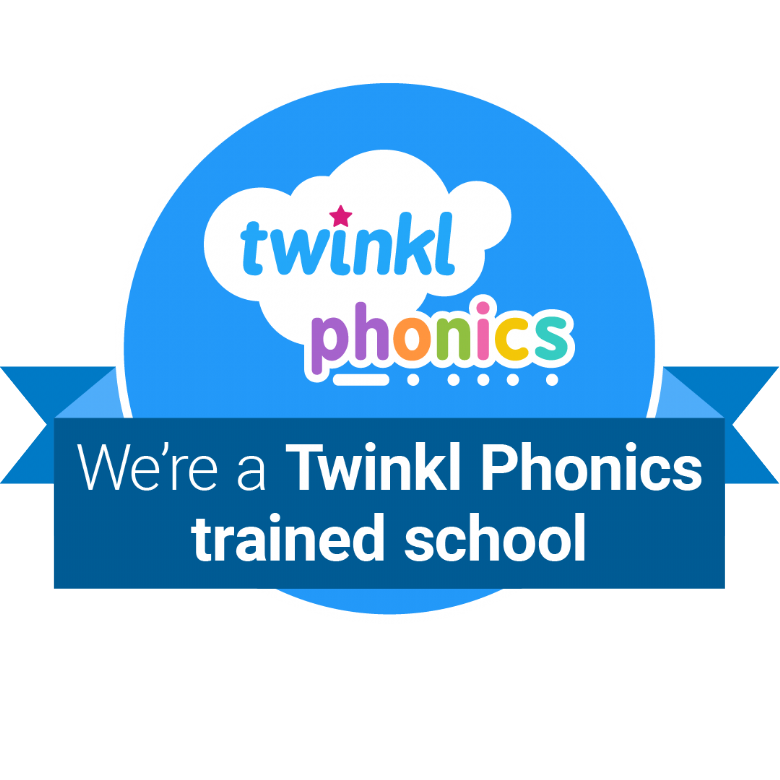
Phonics teaching begins with our youngest pupils from the time they join us in Acorns where there is a real focus on speaking and listening and developing children’s ability to hear sounds around them. This is often done through games, nursery rhymes and rhyming activities.
- Pupils begin learning letter sounds on entry to Reception. Following the Twinkl Phase 1-6 system pupils are immersed in a directed teaching approach which embeds systematic phonics skills as the core skills for reading.
- We use the Twinkl phonics as our main programme and structure for our Primary phonics sessions as its vast range of interactive, engaging and differentiated resources works so well for so many of our learners. We follow the systematic phases 1-6 to work through the sounds, assessment and tracking of reading progress. The Twinkl reading programme has levelled reading books called Rhino readers to support the progress of students, but the other reading scheme books such as the Oxford Learning Tree and Read Write Inc readers also align to the programme. We also use See and Learn apps and Reading Eggs to help to successfully meet the needs of all children.
- Access to Reading Eggs- a phonics app we have also invested in to help to close the gaps in reading that may have occurred in lock down and the pandemic and the children use the school laptops to access this brilliant programme at school on a daily/ weekly basis and can also access the programme with their home logins at home.
- Sounds are taught in a specific order-Phases 1-6 and regular assessment informs future planning and targeted support.
• Phonics is discussed with parents in parent’s meetings and parents are given resources such as a sound mat, sound cards recommended apps to support phonics at home.
• When Reception pupils have started school another meeting and literature on supporting phonics and reading is provided for parents.
• All children will be taught a new sound each week and revise previously taught sounds.
First, pupils will learn:
Phase 1- is exploring the alphabet through Sensory activities whilst covering the following 7 sound aspects:
- Sound Discrimination- Environmental Sounds
- Sound Discrimination- Instrumental sounds
- Body Percussion
- Rhythm and Rhyme
- Alliteration
- Voice sounds
- Oral blending and Segmenting
Second, we will learn to read:
Phase 2 sounds
Words containing these sounds.
s, a, t, p, i, n,
m, d, g, o, c, k
e, u, r, h, b, f,
l, ck, ss, ll, ff
Third, we will learn to read:
Phase 3 sounds:
j, v, w, x, y, z, zz,
qu, ch, sh, th, th, ng
ai, ee, igh, oa, oo,
oo, ar, or, ur, ow, oi,
ear, air, ure, er
Fourth, we learn to read
Phase 4 initial sounds and blends:
Sk, lt, lp, if, and pt
Scr, shr, thr, nch and str
Fr, nl, fl, gl and pl
Cl, sl, sp, st and tw
Sm, pr, sc, sk and sn
Fifth we learn Phase 5 sounds:
ay; ou; ie; ea; oy; ir; ue; aw; wh; ph; ew; oe; au;
They will also learn split digraphs:
a-e; e-e; i-e; o-e; u-e
Finally Phase 6:
Is whole word reading, free readers- guided reading, spelling, grammar and punctuation.
They will also learn, among other things:
Prefixes and suffixes, e.g. ‘in-’ and ‘-ed’
The past tense
Memory strategies for high frequency or topic words
Proof-reading
How to use a dictionary
Where to put the apostrophe in words like ‘I’m’
Spelling rules
How do we support pupils to catch-up?
• Progress is assessed termly, and pupil progress analysis is taken from this. Pupils identified by class teachers and in pupil progress meetings as not making progress have targeted support planned for them and teaching staff are aware of who is a priority for additional support.
• Formative data, BSquared targets, Personal Learning Goals (PLGs) and EHCP targets, informs day-to-day planning and teachers adapt and change this according to the pupil needs.
• Class teachers are in regular communication with parents regarding how to support their child with their reading.
- We have phonics and reading intervention sessions running once a week with a trained teacher and HLTA who works with small targeted groups of children once a week to boost their reading and handwriting. These groups are on a rotation and range from the lowest ability readers to our highest ability readers to stretch and challenge and ensure progression.
How do we support staff to become reading experts?
- Teaching staff, including Teaching Assistants receive reading and phonics training, refreshers and updates as and when required. This may be a specific focus on the SDP or a personal target identified in performance management or specific training identified by staff. This may include in-house training or external training depending on the needs of the staff.
- Whole school CPD and phonics training and updates.
- Twinkl phonics is a progressive and well sourced systematic approach-with lots of adaptable resources and access to texts which align to the scheme.
- Yearly questionnaires and audits of whole school competence and confidence of phonics delivery is collected to identify which staff teams and individual staff members need which training and informs and shapes our yearly CPD and INSET focus.
- The Senior Leadership Team, School Improvement Partner and subject leads monitor phonics and whole class reading sessions and conduct subject learning walks, observations, book looks, pupil and staff conferencing to ensure agreed approaches and consistency are applied across the school.
- Classes have a Reading &Phonics lead TA to help organise and deliver sessions and monitor reading progress.
- The assessment sheet identifies reading levels, phonics gaps and sounds to focus on.
- The reading lead monitors reading and offers guidance to staff with follow-up actions and support plans when needed.


What is the writing skills progression from EYFS to Key Stage 5?
The progression of writing skills from Early Years Foundation Stage (EYFS) to Key Stage 5 is a long-term
process that involves the development of several key writing skills. Here’s a general overview of how these skills progress:
Early Years Foundation Stage (EYFS):
- Children learn to form letters and begin to write simple words and sentences.
- They develop their understanding of sentence structure, punctuation, and grammar through speaking and listening activities.
Key Stage 1 (KS1):
- Children build on their foundation stage writing skills by learning to write longer sentences and paragraphs.
- They begin to develop their ability to use descriptive language and explore different genres such as narratives, poetry, and non-fiction.
Key Stage 2 (KS2):
- Children continue to develop their writing skills by learning to write for different audiences and purposes, using more advanced grammar and punctuation.
- They explore different writing techniques and styles, such as persuasive writing and letter writing.
Key Stage 3 (KS3):
- Children focus on developing their writing skills in more depth, with a focus on structure, clarity, and coherence in their writing.
- They explore different forms of writing, including writing to inform, persuade, argumentative writing and creative writing.
Key Stage 4 (KS4):
- Students develop their writing skills further by learning to write in a more sophisticated and nuanced way, using advanced vocabulary and rhetorical devices.
- They learn to write to a specific purpose and audience, including for accreditation and assessment purposes.
Key Stage 5 (KS5):
- Students refine their writing skills to a higher level of complexity and sophistication.
- They develop their ability to analyse and synthesise information and express themselves in a clear, compelling, and articulate way across a range of different genres and forms.

Phonics is an important component of early literacy development and is usually taught during the EYFS (Early Years Foundation Stage) and Key Stage 1 of the UK National Curriculum. At Nancealverne we offer timetabled discrete sessions through KS1, 2 & 3 to meet our student’s individual learning needs. Within these sequenced sessions
we tailor resources, instruction and delivery to meet the needs for sensory learners and pre-verbal learners.
Early Years Foundation Stage (EYFS):
- Children are introduced to phonics through songs, rhymes,
- and stories that emphasise sounds and letters.
- They practise mark making and initial letter formation through sensory activities, using a range of materials and equipment.
- They learn to distinguish between different sounds and develop listening and oral blending skills.
- They are introduced to the basic phonemes (individual sounds) and graphemes (letters or combinations of letters that represent sounds) of the English language, such as the letters s, a, t, p, i, n.
Key Stage 1 (KS1):
- Children continue to develop their phonics knowledge and skills through a systematic program of phonics teaching, such as the government recommended phonics programme called ‘Twinkl Phonics.’
- They learn more complex phonemes and graphemes and begin to use them to decode and spell words.
- They develop fluency in reading and writing, and are introduced to more sophisticated vocabulary and sentence structures.
Key Stage 2 (KS2):
- Children continue to develop their phonics skills working through the phonics phases, but the focus shifts towards reading comprehension and creative writing.
- They are exposed to a wide range of fiction and non-fiction texts and learn to analyse and evaluate them.
- They develop their ability to use language creatively and expressively, and are encouraged to experiment with different styles and genres.
Key Stage 3 (KS3):
- Phonics is not typically taught explicitly in these stages unless needed, but it continues to play an important role in literacy development.
- Children will practise skills through comprehension and SPAG tasks.
Key Stage 4 (KS4):
- Students are expected to have a solid understanding of phonics and use it to decode and spell unfamiliar words.
- They are exposed to more challenging texts and are expected to read and write with greater sophistication and critical thinking skills.
- When the phonics programme is not applicable the focus then becomes the development of social and functional sight vocabulary.
- Reading is functional, with sight words and symbols linked to the accredited pathways. This may include whole word recognition and the use of AAC/Visuals and Sensory based activities to support the learners who are non-verbal or have sensory impairments.
Key Stage 5 (KS5):
- Phonics is not typically taught explicitly in this stage either, but it remains an important component of literacy development.
- Students are expected to have a strong foundation in phonics and use it effectively in their reading and writing.
- They are exposed to a wide range of texts, and are expected to analyse and evaluate them with a high level of critical thinking and language proficiency.
- When the phonics programme is not applicable the focus then becomes the development of social and functional sight vocabulary.
- Reading is functional, with sight words and symbols linked to the accredited pathways. This may include whole word recognition and the use of AAC/Visuals and Sensory based activities to support the learners who are non-verbal or have sensory impairments.
 At Nancealverne reading is at the heart of all learning. We aim to build all pupils’ skills in literacy and reading, and improve their fluency, confidence and ability for their next stage in school and in life outside of school. Pupils will develop their functional reading skills, whether that be an ability to recognise and use (receptively or expressively) symbols and sight vocabulary or be able to read phonetically and recognise whole words using them for functional and leisure tasks.
At Nancealverne reading is at the heart of all learning. We aim to build all pupils’ skills in literacy and reading, and improve their fluency, confidence and ability for their next stage in school and in life outside of school. Pupils will develop their functional reading skills, whether that be an ability to recognise and use (receptively or expressively) symbols and sight vocabulary or be able to read phonetically and recognise whole words using them for functional and leisure tasks.
We implement adjustments as required for students with more complex needs. This involves a variety of delivery methods including colourful semantics and an attention autism approach.
Early Years Foundation Stage (EYFS):
- Children begin to develop basic reading skills such as recognising and identifying letters, phonemes, and simple words. They also develop their listening and comprehension skills through storytelling and rhymes.
Key Stage 1 (KS1):
- In KS1, children continue to develop their phonemic awareness and phonics skills, learning to blend sounds to form words.
They also begin to read simple sentences with understanding and are introduced to a wider range of texts.
Key Stage 2 (KS2):
- At this stage, children become more proficient readers and are able to read longer and more complex texts independently. They also develop their comprehension skills and begin to analyse and evaluate what they have read.
Key Stage 3 (KS3):
- In KS3, students are expected to read and comprehend a wide range of texts, including literature, non-fiction, and media texts. We begin to focus on more functional reading skills to ensure students are ready for life after school. We begin to develop critical thinking skills and make inferences and draw conclusions from what has been read.
Key Stage 4 (KS4):
- At KS4, students develop more advanced reading skills, including the ability to analyse language and literary techniques. They also learn to evaluate texts in terms of their purpose, audience, and context. Functional reading is key to prepare for adulthood.
Key Stage 5 (KS5):
- In KS5, students focus on functional reading and how to read texts in greater depth, developing their understanding. They also develop the ability to write about more important and complex ideas and arguments.
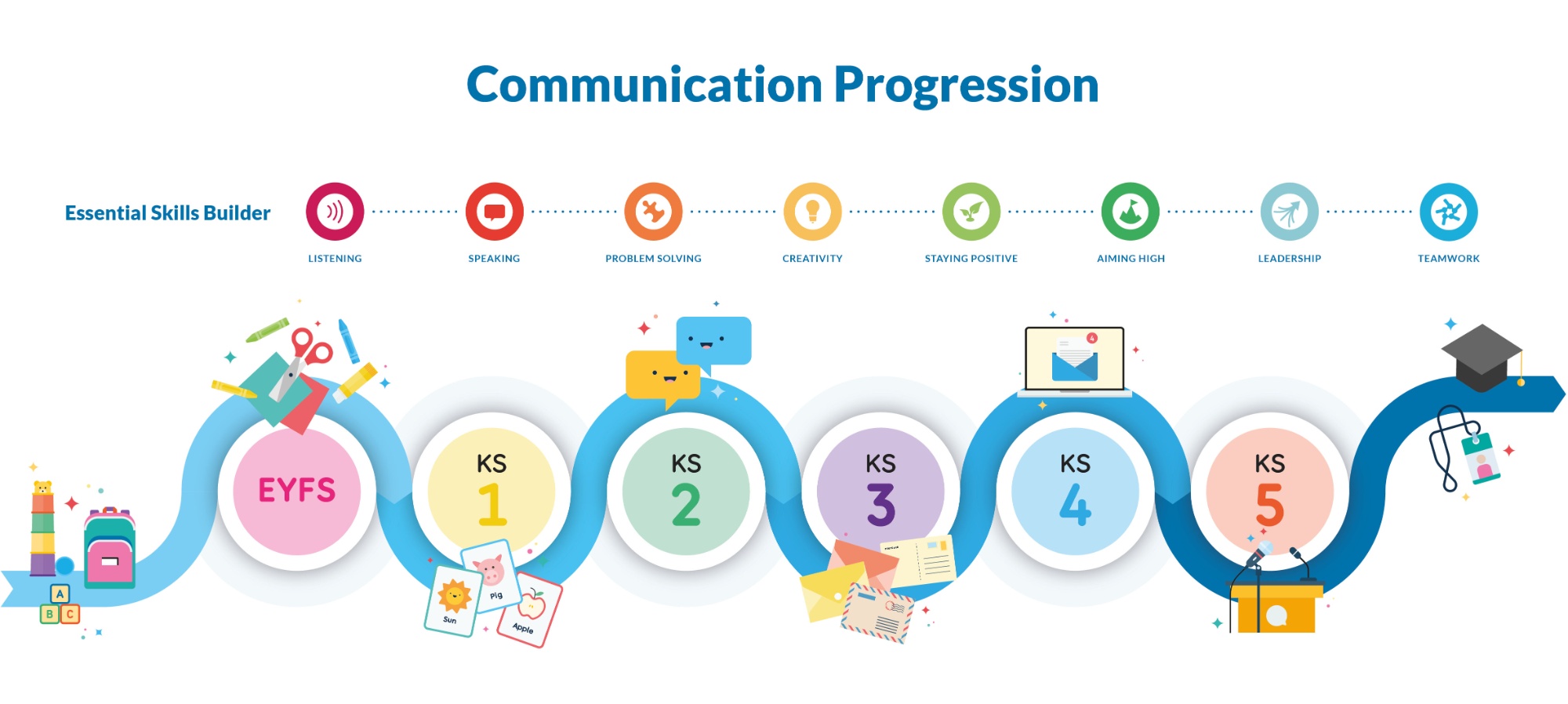
Children will follow individual pathways as outlined by specialists and supported by professionals. We are a total communication school which is an approach to communication that aims to use a variety of methods to convey information to individuals, especially those with communication challenges. Students have access to AAC devices if recommended by speech and language therapists and staff are trained to utilise them with alongside learning. The total communication approach considers environmental considerations for all our students including noise levels, classroom environment and sensory considerations.
Early Years Foundation Stage (EYFS):
- Explore materials, equipment, opportunities to communicate and interact.
- To be given real choices.
- To be spoken with and not about.
- Low tech AAC – pictures/symbols/PECs.
Key Stage 1 (KS1):
- Identify a mix of communication system which works.
- To ask for what they want – make requests.
- To begin to share my feelings.
- Communicate in spoken/pictorial/written methods.
- To say no and refuse/reject choices.
- Making clear choices.
Key Stage 2 (KS2):
- To have identified a speech system.
- Sharing my feelings more successfully.
- High tech AAC – to be taught how to communicate.
- To have a speech system in working order and accessible at all times.
- Structuring their talk/voice logically and coherently.
Key Stage 3 (KS3):
- To ask and know about my schedule.
- To communicate on my chosen system.
- To use a range of comms systems.
Key Stage 4 (KS4):
- To ask and answer questions confidently.
- Functional speech for preparation for adulthood.
- Convey more complex information.
- Using language techniques to express information.
Key Stage 5 (KS5):
- To have fluency in using my chosen systems.
- To answer all questions & tasks.
- To express opinions.
Whilst we follow the objectives of a structured subject-specific curriculum, we offer highly differentiated and personalised learning programmes. We deliver a specialist, high-quality, and relevant education. This focuses on personal skills and academic achievement, setting high expectations for all. We appreciate that students may not be working at age-related or key-stage expectations, and therefore measure progress from individual starting points.

